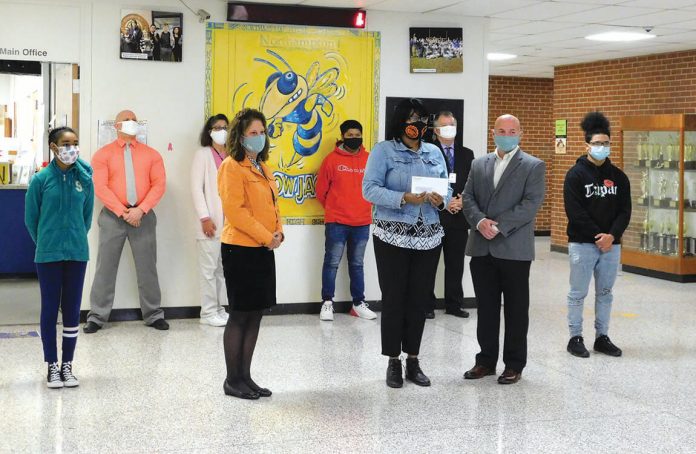
By Stefanie Jackson – Northampton middle and high school students met Eastern Shore Rural Health administrators Nov. 30 to give them a check for more than $500 to help pay Chesapeake Bay Bridge-Tunnel tolls for cancer patients who must travel to get medical care.
“Thank you from the bottom of our hearts. Your generosity, your spirit … to volunteer and donate money towards this is phenomenal,” Eastern Shore Rural Health CEO Nancy Stern told the students.
Northampton students raised $540 in October for National Breast Cancer Awareness Month.
The money was raised through a “loose change campaign” so anyone could participate, no matter how much students had to give, but some individual contributions were as high as $50 or $100.
Several students who have jobs were eager to give sizable donations from their own paychecks, school staff said.
Cathy Fox, a bookkeeper for Northampton schools, said she was so astonished by the students’ generosity that she asked, “Are you sure you want to do this?” before accepting their donations.
“I know right now finances are very challenging for all of us … and to give during this time is truly a gift beyond the dollars themselves,” Stern said.
All the students who participated were close someone who had cancer, said school counselor Ivory Turner.
Some students were so enthusiastic about the fundraiser that they have already asked if they could hold another, she said.
Northampton teacher Sheri Noll, whose class raised the most money, also attended the event.
The students who presented the check to Eastern Shore Rural Health were Annabel Clarke, Emilio Gonzalez, and Lamont Wilson. Students who also raised money but were not present at the event included Luke Newman and Gavin Ricci.
Stern, who is retiring, was accompanied at the event by incoming Eastern Shore Rural Health CEO Matt Clay.
She described the types of patients who will benefit from the students’ donations.
Some patients have no health insurance and can’t afford the full cost of medical care, so Eastern Shore Rural Health gives them discounts, Stern said, referring to the ESRH sliding scale program.
ESRH has arrangements with many of the specialists, who also offer discounted medical services, she added.
But patients also struggle to afford traveling frequently across the bay for treatment, due to the high cost of tolls. A typical trip, if the traveler returns within 24 hours, costs $20 in CBBT tolls alone.
If an ESRH doctor refers a patient to a specialist across the bay, but the patient can’t afford the tolls, the patient is referred to the Medical Toll Assistance Program.
The toll assistance program is possible through a partnership of the Chesapeake Bay Bridge-Tunnel and Eastern Shore Rural Health, which was established in 2003.
Applicants who demonstrate financial hardship receive free passes for the CBBT to travel to medical appointments. Patients who need to see a specialist for cancer, heart problems, surgery, or other serious health issues may apply.
An application may be obtained by visiting www.esrh.org and should be returned with a copy of the patient’s most recent check stub or tax return.
A doctor’s note or appointment card also must accompany the application, which must be submitted at least one day before the appointment.
All donations to the Medical Toll Assistance Program go directly to patients – none of the funds are used to cover administrative costs, Stern noted.
She said the students’ effort will impact the “big picture” for patients in need.
“Every patient has a story, and we collect them,” Stern said. “It’s like a whole community that has embraced this patient to allow further care – probably lifesaving care – that they otherwise wouldn’t have.”
“There’s no place like the Eastern Shore … as far as the way the community embraces” and helps others, she said.


